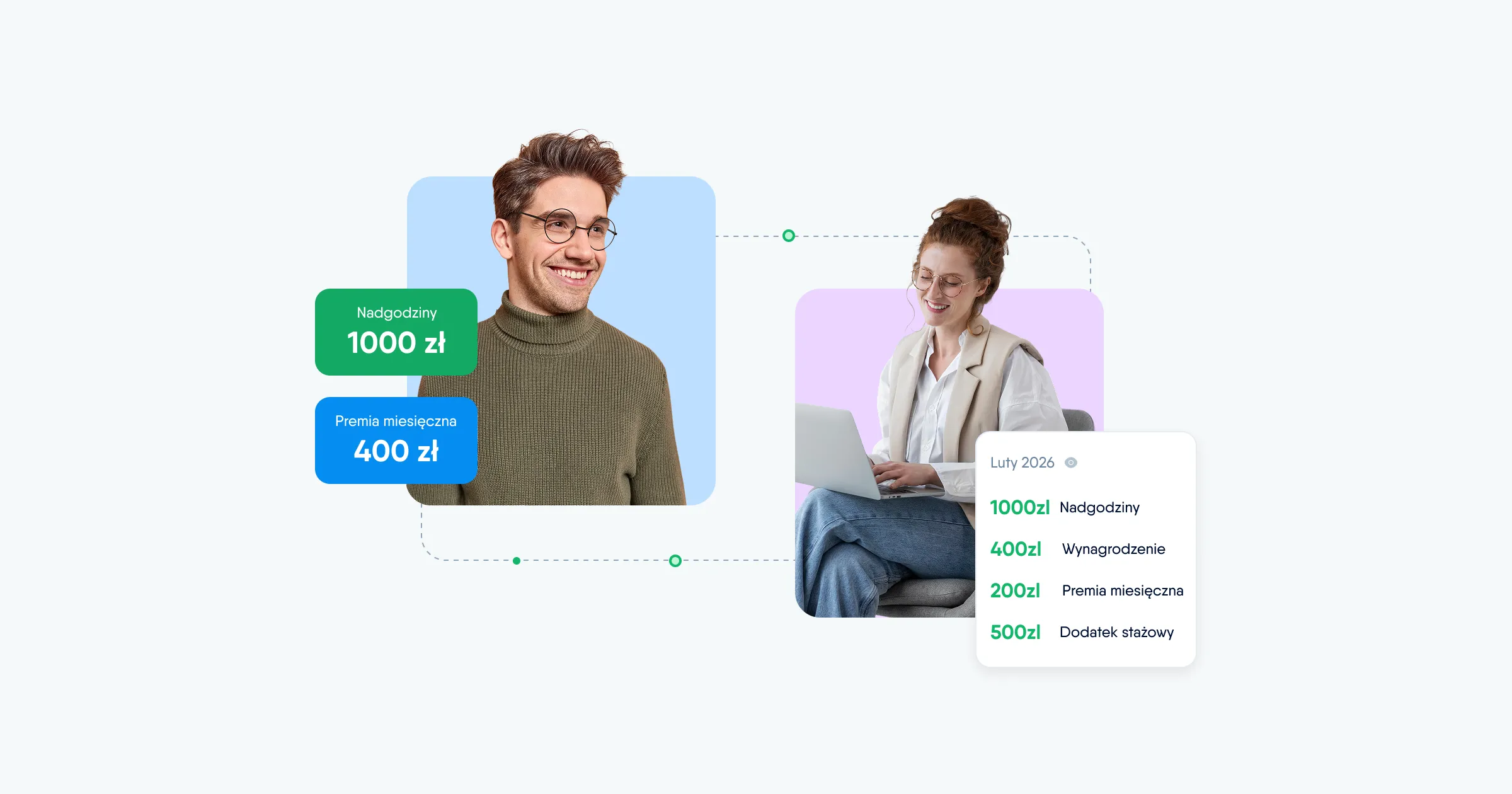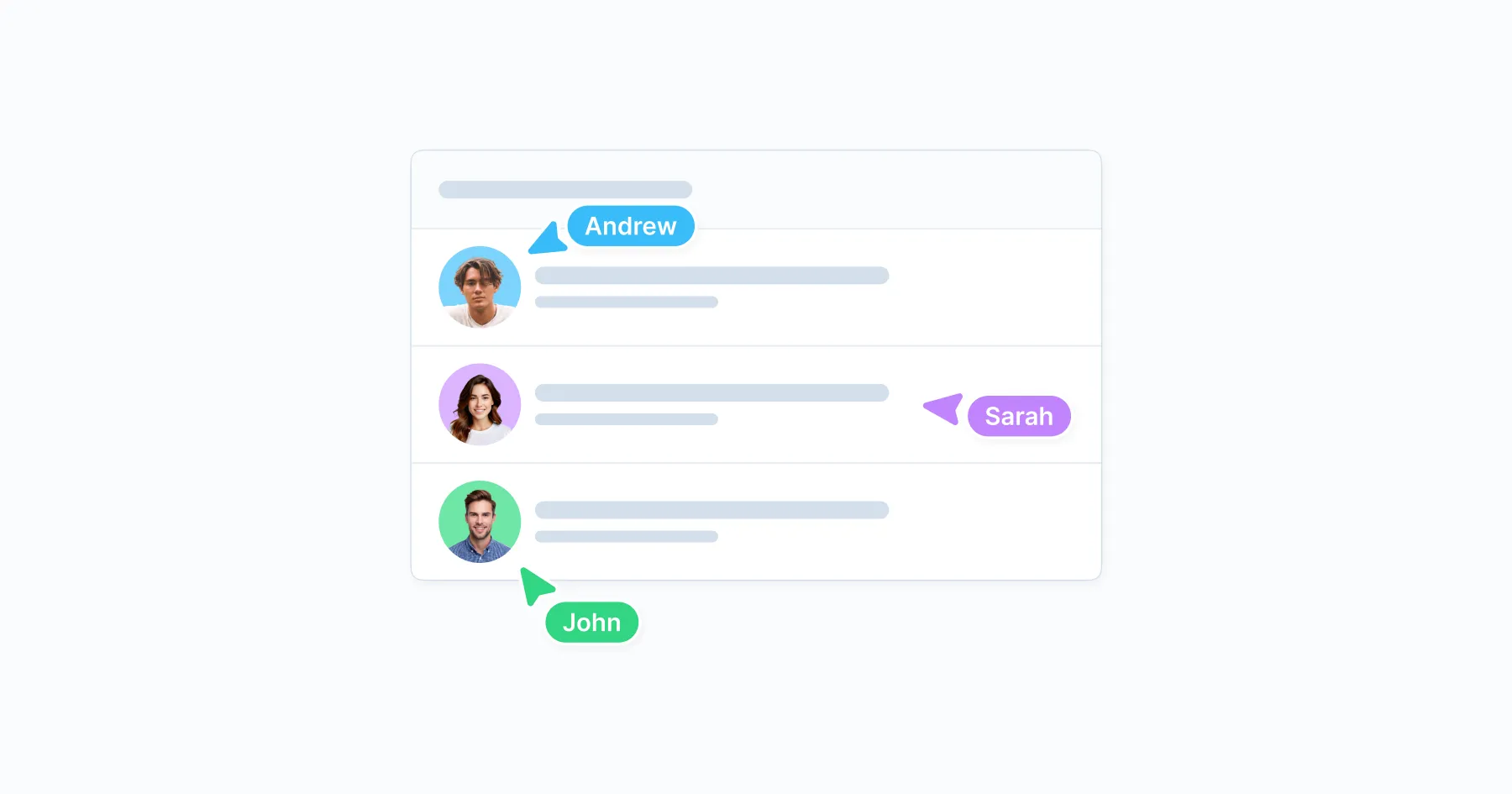
Personality type tests: why do they matter to businesses?
Let's take a look into the future… Imagine HR specialists can read minds, discovering the most hidden abilities and personality traits of employees. Stop! HR managers already know how to do this thanks to various personality tests. Along with the key questions and tasks, personality type tests help identify the ideal candidate or develop a current employee in the company. What types of personality tests exist and why do businesses need them? We explain in the article!
Why should businesses use personality tests?
Resume review and interviews allow you to predict the effectiveness of a new employee in your company by only 16%. But there's no need to despair: using individual tools, such as personality tests, can increase the effectiveness rate to 78%. Impressive? We offer to learn more about the strengths of these promising HR tools:
1. More effective employee hiring
Unlike resume analysis or personal interviews, personality assessment allows for the precise identification of a candidate's personal traits, such as openness, conscientiousness, extroversion, leadership orientation, etc. This will help to understand in advance whether the candidate will fit into the team and contribute to the company.
2. Reducing the time to select a candidate
Using tests at the beginning of the process helps filter out candidates who are not a good fit at all. This allows recruiters to focus only on promising profiles throughout the selection process, and ultimately hire the best specialists.
3. Creating a dream team
Personality type tests help assess the prospects of candidates or employees, such as passion for learning, ambition, initiative, motivation, and curiosity. You will know which employees are striving for career advancement and which are willing to be content with less.
4. Reducing Conflict
Tests allow you to model conflict situations and understand how employees or candidates will react. This knowledge will help prevent possible misunderstandings in the company in advance.
5. Budget Savings
Finding the optimal candidate is a time-consuming and labor-intensive process. It can stretch on for weeks or even months. The tasks of this position are distributed among colleagues, which increases the workload. Personality type tests will initially help select the best candidate who can become a lasting part of your company.
You have already learned about the advantages, now we invite you to get acquainted with the most popular personality tests.
The 16 personalities test: What is it?

The 16 Personality Test or the Myers-Briggs Type Indicator (MBTI) can be considered one of the most popular methods for determining a person's key character traits. It helps millions of high school graduates around the world try to answer the important question, "What field and profession should I choose?", while HR specialists assess how well a person fits the culture, philosophy, and goals of the company.
In the U.S., more than 10,000 organizations, 2,500 higher education institutions, and 200 government agencies buy and use the Myers-Briggs test. But is the 16 personalities test really the gold standard of assessment? Let's find out together!
The concept of the 16 personality test
The Myers-Briggs test is based on Carl Jung's theory, which states that a person perceives the world using four primary psychological functions: sensation, intuition, feeling, and thinking. Interpreting Jung's theory, MBTI classifies personality types along four axes:
- EI: introversion vs. extraversion;
- SN: sensing vs. intuition;
- TF: thinking vs. feeling;
- JP: judging vs. perceiving.
According to the Myers-Briggs hypothesis, there is one dominant preference in each of the four pairs. Each person who answers the questions of the test (there are several modern versions of the test, with the most popular having 94, 144, or 167 questions) will be able to find out which of the 16 possible type combinations they belong to.
What is wrong with the 16 personality test?
Despite the great popularity of the test, the academic world is unfriendly towards the Myers-Briggs indicator:
- The theory of Jung, which was taken as a foundation, is ignored by the psychological community, and even Jung warned that the “types” of his personality are merely rough tendencies he observed, not strict classifications.
- Flattering, vague descriptions of many types have a vast number of overlaps and can apply to different people. This is known as the Forer effect and is a technique that has long been used in astrology, fortune-telling, and other forms of pseudoscience.
- Upon retaking the test five weeks later, up to 50% of test-takers receive a completely different result.
Moreover, in certain situations, such as during a job interview, candidates may choose desired answers for a given vacancy or, due to stress, may prefer options that are not characteristic of them. This reduces the predictability of success for specialists in positions.
Enneagram Test: What is it?
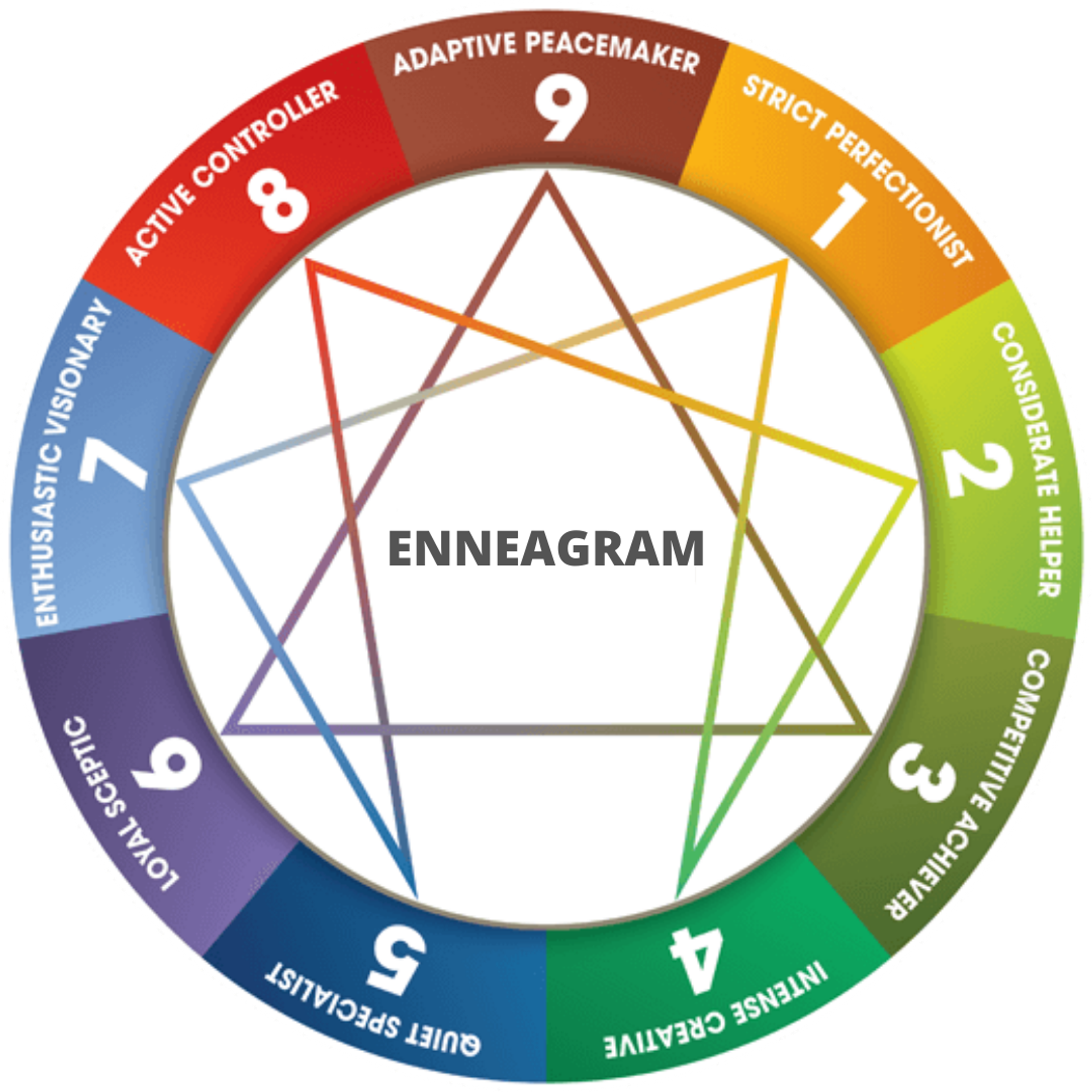
Another popular test is the Enneagram (Greek ennea — "nine"; gramma — "writing") — a test for self-analysis and self-development that helps identify a person's strengths and weaknesses, motivations, and fears. Therefore, it is often used by HR specialists to help employees improve their performance metrics.
The concept of the Enneagram test
The Enneagram describes 9 personality types that are found among all people. It is shaped like a circle, with personality types placed equidistantly and numbered from 1 to 9:
- Perfectionist: principled, goal-oriented, reserved.
- Helper: generous, demonstrative, pleasant to people, and possessive.
- Achiever: adaptable, outstanding, goal-oriented, and image-conscious.
- Individualist: expressive, dramatic, self-centered, and temperamental.
- Observer: insightful, inventive, secretive, and isolated.
- skeptic: charming, responsible, anxious, and suspicious.
- Enthusiast: spontaneous, versatile, greedy, and scatterbrained.
- Boss: self-assured, decisive, headstrong, and aggressive.
- Peacemaker: receptive, reassuring, complacent, and humble.
All of them are interconnected by arrows that indicate that human behavior varies depending on life situations: in stress, joy, calmness, etc.
The test was developed in the 1970s, and since then, many interpretations and modified versions have emerged. When taking the test, a person must choose an option from two statements. The answers of the test subject can provide insight into their approach to personal relationships and their work style in a professional environment.
What is wrong with the Enneagram test?
Like many personality tests, the Enneagram is considered pseudoscientific. There is a lack of definitive studies that confirm its accuracy or effectiveness. Therefore, it is recommended to use it in most cases for personal purposes.
But don't be in a hurry to cross it off the list of potential personality type tests! Knowing your own type or the personality type of a colleague or job candidate can help an HR specialist predict and prevent problems between employees.
Thomas-Kilmann Test: What is it?

Working in harmony and without conflicts is the dream of almost all employees and managers. To move closer to its realization, companies can use the Thomas-Kilmann test or TKI (Thomas-Kilmann Conflict Mode Instrument). This questionnaire determines an individual's behavior and reactions in a conflict situation and offers the most optimal solutions. It is an extremely useful tool, as according to Kenneth W. Thomas, managers spend a quarter of their time resolving conflicts.
The TKI Concept
The authors of the test identify 5 conflict resolution styles:
a) competition. A behavior model in which a person does not wish to compromise and refuses to cooperate.
b) compliance. In this situation, a person resolves the conflict at the expense of their personal interests.
b) compromise. A situation in which a person is willing to cooperate and persistently defend their interests.
g) ignoring. A person tries to evade the conflict, not satisfying the requests of either side of the conflict.
d) cooperation. The ability to find a "golden mean" in a situation where the interests of both participants in the conflict are taken into account.
After completing the test, the employee learns about their conflict resolution style, in which situations it is recommended to apply it, and also learns the values of other styles. Using the Thomas-Kilmann assessment allows people to focus on and develop their strengths.
Big Five (OCEAN)
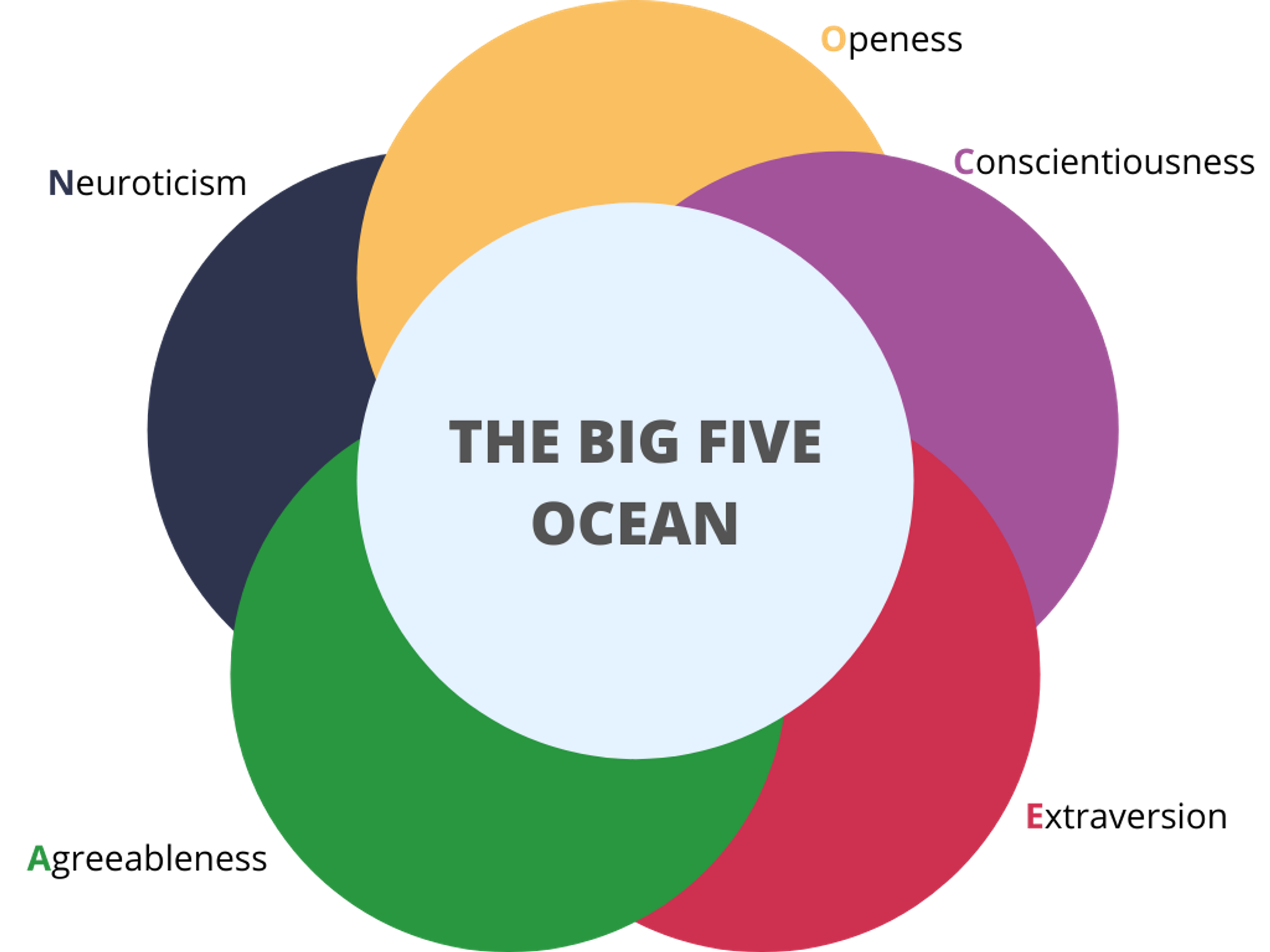
Many psychologists believe that there are only 5 personality types. All these types are grouped under the name Big Five. There are also abbreviated names like OCEAN or CANOE. Unlike many other tests, the Big Five has received approval and empirical support from many scientists. Moreover, the personality types identified in the questionnaire are found in people from more than 50 cultures around the world, which indicates the universality of the test.
The Big Five concept
“The Big Five” refers to broad categories of personality traits. Researchers do not always agree on the precise labels for each dimension. Often, sources use different names and interpretations for the types:
- conscientiousness - conscientiousness: the level of care you exhibit in life and work situations.
- agreeableness - agreeableness: this parameter measures how well you get along with others.
- neuroticism - neuroticism: measures emotional reactions, how you respond to various situations.
- openness - openness: measures your level of creativity and your desire for knowledge and new experiences.
- extraversion - extraversion: this parameter measures your level of sociability.
To determine the type, it is necessary to complete one of the questionnaires based on the "Big Five" method. They range from 10 items (for example, TIPI) to 240 (NEO-PI-R) and more. HR specialists and psychologists use the "Big Five" theory in personality tests for career growth, recruitment, and candidate assessment.
Whether to use personality type tests or not is entirely up to you. But we are confident in one thing: the more modern HR solutions you implement, the more efficiently and productively you will work. Transition to the digital side of the HR world — test PeopleForce for 14 days for free.
With over five years in HR tech content creation, Maria explores how technology, people, and culture shape the workplace of today. Her interests include HR, AI, IT, and personal development, and she brings a data-driven, human-centered perspective to her writing.
Get started with PeopleForce today
Automate your HR routine to create a high performance culture in your company. PeopleForce is your best HRM alternative to stay business driven but people focused.
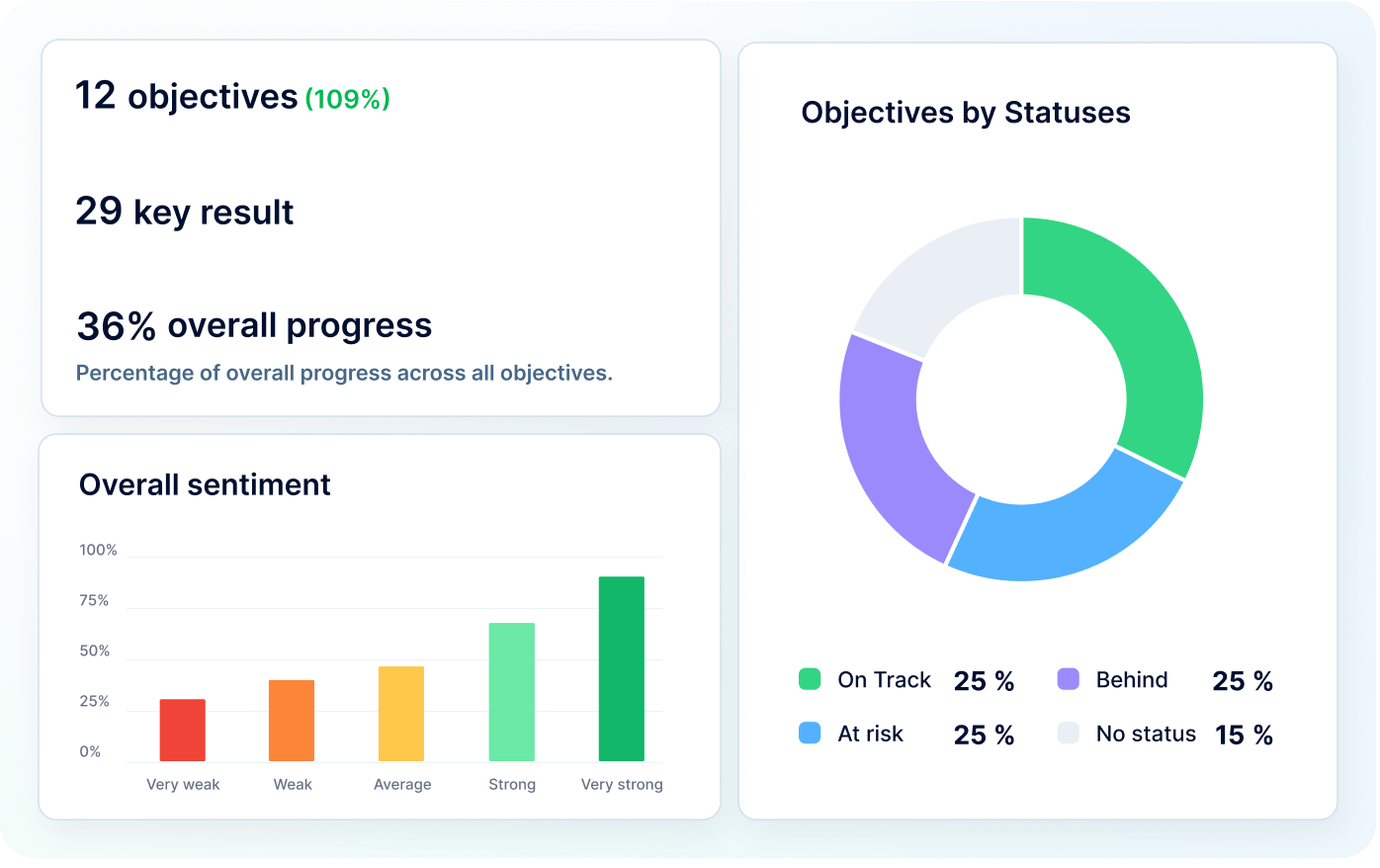
Recent articles
How much time HR platform saves for HRs and admins
Discover how modern, all-in-one HR software simplifies complex processes, ensures compliance, and boosts efficiency to help HR teams manage growing responsibilities with ease.
How to work with different types of employee personalities after the 16 personalities test?
It's important not just to know about the 16 personalities test but to work with the results in practice. Let's try to figure out how to interpret the results.
Typing employees using the 16 personalities test: 6 ways to use It at work
The 16 personalities test is an unconventional way to learn more about your employees. Here's how to use it effectively.
